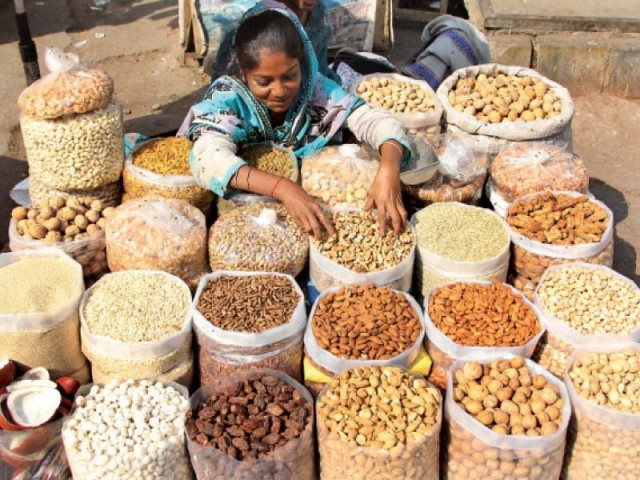Murky situation: Status of city’s female restrooms is in the toilet
Two women toilets at Empress Market have been turned into warehouses

Empress Market in Saddar hosts 1,700 shopkeepers but there are only six toilets, all of which are for men and women are left with no choice but to share the toilets. PHOTO: AYSHA SALEEM/EXPRESS
Gulaal Bai, dressed in a red and white sari, sells almonds, pistachios and dry fruits outside the main entrance of Empress Market for over 12 hours a day but when nature calls, she has nowhere to go except the men’s toilets in the market.
Until recently, there were two separate toilets for women but they have now been converted into warehouses, forcing women to use the men’s toilets. Empress Market in Saddar hosts 1,700 shopkeepers but there are only six toilets, all of which are for men. Women have no choice but to share the toilets after handing over a Rs7 fee to the caretaker, Asif Masih.
Barriers to educating girls in Swat
“It is sad that women use these toilets but there are only two female shopkeepers here and no visiting females use it,” explained Masih. He added that all the money collected through the toilet fee is deposited in the bank, while he has to install taps or pipes that are stolen from the toilets himself. Bai, who leaves home at seven every morning and reaches home at nine at night, complained that women who set up roadside stalls outside the market have stopped raising their voices against the problem. “There is no use of speaking out when nobody listens,” she lamented. “At the end of the day I have to earn my bread and butter,” she said with a smiling face and sad eyes.
Men’s toilet
Broken white tiles, rusted iron grill and faded yellow paint adorn the six small washrooms at the queen of traditional markets in the city. The male toilets were built by the Karachi Municipal Corporation (KMC) 18 years ago. Masih, who is employed by the district municipal corporation, serves as the caretaker and cleans the toilets six times a day. He has worked for 12 hours a day for the last 32 years.
“These toilets are used by more than 150 people daily and over 250 on weekends,” explained Masih about how important a toilet is at a market that serves thousands of customers daily.
A vegetable seller revealed that the space reserved for female toilets had been taken over by shopkeepers and turned into a makeshift warehouse. “All kinds of things are kept here; flour, vegetables, fruits and even spices,” he said.
World Toilet Day: Public health at risk from poor hygiene, sanitation
Unaware officials
The deputy director of KMC’s estate department, Akmal Dar, told The Express Tribune that they do not have any data on the KMC built-and-maintained toilets nor does he remember their number. “I had a list of toilets some three years back but as of today I do not even have that list,” he said. He added that they made a list of toilets when an NGO, the Rah-e-Rast Trust, filed a petition in the Sindh High Court to submit details on the city’s public toilets. Dar estimated that they have two toilets in Empress Market for women and one toilet on Shahrah-e-Liaquat near an ice cream parlour. All the toilets in Lea Market, Bohri Bazaar and Light House are for men.
“If the Empress Market female toilets have been encroached by the shopkeepers then we will evacuate them and make them functional soon,” he assured. Rah-e-Rast Trust chairperson Agha Syed Attaullah Shah said they have pinpointed around 2,200 places where there should be public toilets across Karachi. “These include 78 parks, 182 graveyards, 33 markets and 42 prominent roads,” he said. He also pointed out that the KMC and cantonment boards have toilets specified for women at only two places in the city; the Karachi Zoo and Bin Qasim Park in Clifton.
According to the data provided by a KMC official, there are 124 toilets around the city, of which 30 are functional while the rest have been closed, shifted somewhere else or turned into shops.
Published in The Express Tribune, January 6th, 2016.



















COMMENTS
Comments are moderated and generally will be posted if they are on-topic and not abusive.
For more information, please see our Comments FAQ